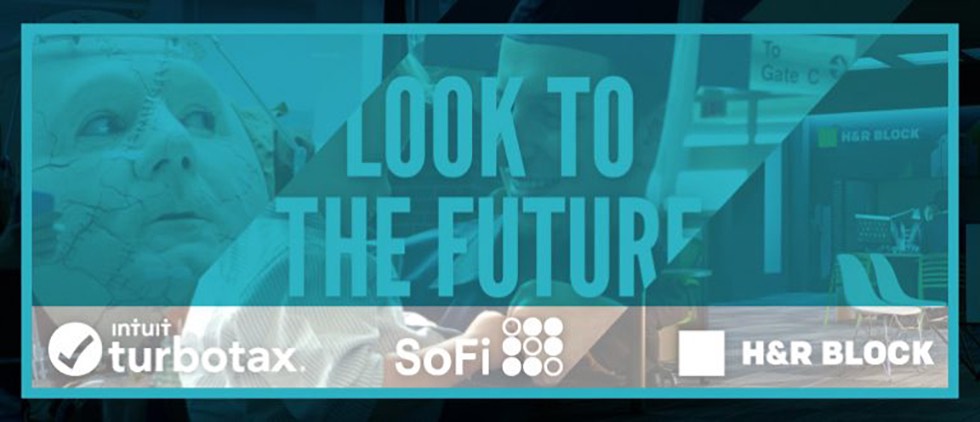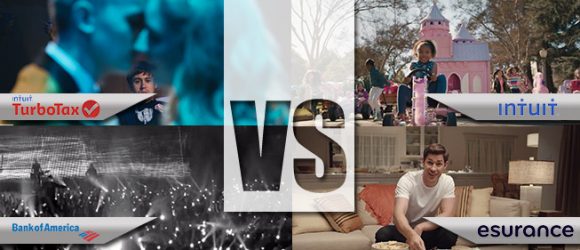Greatest Super Bowl Ever? Maybe Not for Financial Brands

No matter which team you were rooting for, there’s little argument that Super Bowl LI was a great game. (Dare we say the greatest ever?) But why deconstruct the game when you can pick apart the commercials, specifically those from financial service brands?
When it comes to financial service companies in Super Bowl LI, the main thing we noted was a lack of advertisers. It’s almost a given that the “Big Game” will have commercials for cars, snack foods, beer, movies and consumer packaged goods, and that was certainly true in 2017. Financial brands, on the other hand, seem to come and go from year to year, and this time many stayed on the sidelines… with only three notable exceptions.
TurboTax
While it isn’t exactly a financial brand, TurboTax does help consumers manage one of their most important and universal annual financial transactions: the tax return. It makes sense in many ways. By early February we’ve received most tax documents, and we start to think about getting that task off the to-do list.
TurboTax has been in the Big Game before, utilizing wildly different approaches. In 2014, it asked consumers to think of taxes as a “year of you” recap. In 2015, it re-imagined the Boston Tea Party (if only we’d had TurboTax in 1773!). Last year, TurboTax told us that it doesn’t take a genius to do our taxes. This year, it went with a “wacky” concept (a Super Bowl mainstay) seen first in the brand’s pre-game teaser:
So, doing taxes with TurboTax is so easy that Humpy Dumpty can do them while sitting on a wall… until they are so hard that he falls down. Got it.
Then, TurboTax ran this in-game follow up:
Here, Humpty gets advice on how to claim medical expenses via a live video chat with an agent. (There was also a “part three” to this story that also features the video chat.)
The spot seem to have received mixed reviews. Digiday found it “unsettling,” but it came in at #15 on USA Today’s Ad Meter. To us, it seems a little odd to pair a fairy tale with tax software, but we felt the same way when the brand tried to re-imagine American history. TurboTax does manage to focus on a product feature: live online video chat support. If consumers are hesitant to use the online service, perhaps knowing about live support will help motivate them to try it out. Hopefully, TurboTax based promotion of that feature on actual consumer insight.
The takeaway here is that with TurboTax you can take care of your return anytime, anywhere (even on a wall), and if you have a question, there’s an actual person there to help. Simple, right?
Well… not according to that OTHER tax preparation advertiser this year.
H&R Block
Having sat out the last few years, H&R Block came back to the Super Bowl with an A-list spokesman touting a really smart machine.
That’s Jon Hamm, a.k.a. Mad Men’s Don Draper, telling you that H&R Block agents now have access to IBM’s Watson. It’s a computer that is so powerful it can change the world… and your tax return (by finding all possible deductions). Does this mean taxes are so complex that you need both a person AND the world’s most famous AI computer to get them done? Someone better tell TurboTax.
This spot seemed to fall flat with online ratings, coming in #55 on the USA Today list. We found the message to be a bit confusing. It was a technology spot for a company that has traditionally focused on the annual ritual of human interaction to help consumers slog through a task they hate. If your Universal Selling Proposition is that you have an army of people to help consumers, why spend 90% of your spot focusing on the idea of a supercomputer, especially a computer like Watson with a personality that has even been on Jeopardy? Maybe a few more seconds spent showing how the agents can use Watson would have helped draw a clearer connection to the computer as a benefit that only the H&R Block team can provide.
Forbes also published a post contrasting these two spots.
SoFi
Last year, this banking upstart bought its first Super Bowl spot with the tag line “great loans for great people,” putting the focus on SoFi’s customers, a strategy it has continued into 2017. But this year, instead of buying a Super Bowl ad during the game, SoFi took a gamble and purchased a slot during overtime, something that hadn’t happened in any of the prior 50 games. Turns out that gamble paid off.
Given the nature of the buy, our bet is that SoFi didn’t approach this as a “Super Bowl ad,” and maybe that’s a good thing. The spot is solid, and, like the brand’s effort from 2016, it keeps the focus on customers (though this year SoFi calls them “members”). The financial brand carries this effort through in a series of “member stories” videos on its website.
SoFi also demonstrates a good sense of its core target audience: Millennials. And the creative execution uses title cards with large type and images to convey the message, making the spot easy to follow (especially when everyone is freaking out about an overtime game). This approach also makes the spot a good fit for social media advertising (where most videos play without sound). This is a solid effort from SoFi, and it’s nice to see that the gamble paid off.
On the sidelines
Who was out this year? Banks, insurance companies and payment products. No Bank of America, no SunTrust, no Nationwide, no Esurance, no PayPal, no American Express, no Discover or even (once again) long-time NFL sponsor Visa. We’ll likely never know why they all sat out, and they may all have different reasons, but the lack of any “core” FS brands was notable.
However, Visa did use its NFL sponsorship to focus once again on a social media strategy with a series of video posts leading up to the game. The videos featured NFL players using Visa’s technology, joking and talking about Visa convenience and even answering funny trivia questions.
As it did for Super Bowl 50, Visa once again showed that buying a really expensive spot is not the only way to get eyeballs during the Super Bowl. Sure, its league sponsorship gives the brand access to NFL players and marks, but it is clearly playing a different game… one that likely lasts longer than 30-60 seconds.









